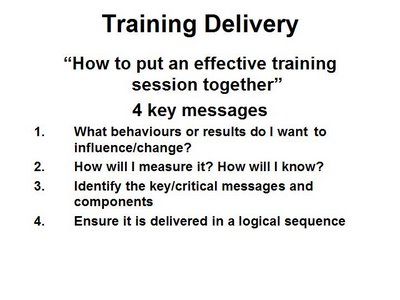Begin with the end in mind. What behaviours or results do you want to influence or change?
What processes and measures will you put in place to confirm the success of the training?
Make sure that you identify the key or critical messages and the individual components that you wish to impart to develop either... knowledge and/or skill or to influence attitude. (You can't train an attitude). Then....
Ensure that it is delivered in a logical sequence. Think about your audience and remember the saying "I hear - I forget. I see - I remember. I do - I understand." You will have a mixture of learning styles within your audience, therefore it makes sense to integrate a variety of learning delivery to accommodate those styles.
Too much theory may put off the Pragmatists* (who prefer to learn when there is a link between the subject and implementing on the job)) and Activists* (those who prefer to try new and different things. They like action based learning). Launching people straight into role-plays and getting them involved in the "doing" with minimal input may not be the best way of engaging the Theorists* (who need to explore and test theories before implementation. They are rational and logical) and Reflectors* (who prefer to observe first and think about what they have learned before application).
Think about your audience in respect of their "Readiness" for the the training. Where are they in relation to their Competence - (Knowledge, Skill and Relevant Experience) and Commitment - (Confidence and Motivation)?
Have you linked the training to your diary and is it relevant to what is happening now in the business?
Ensure that it is delivered in a logical sequence. Think about your audience and remember the saying "I hear - I forget. I see - I remember. I do - I understand." You will have a mixture of learning styles within your audience, therefore it makes sense to integrate a variety of learning delivery to accommodate those styles.
Too much theory may put off the Pragmatists* (who prefer to learn when there is a link between the subject and implementing on the job)) and Activists* (those who prefer to try new and different things. They like action based learning). Launching people straight into role-plays and getting them involved in the "doing" with minimal input may not be the best way of engaging the Theorists* (who need to explore and test theories before implementation. They are rational and logical) and Reflectors* (who prefer to observe first and think about what they have learned before application).
Think about your audience in respect of their "Readiness" for the the training. Where are they in relation to their Competence - (Knowledge, Skill and Relevant Experience) and Commitment - (Confidence and Motivation)?
Have you linked the training to your diary and is it relevant to what is happening now in the business?
* (Honey & Mumford - Learning Styles)




No comments:
Post a Comment